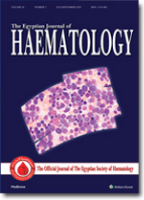
Egyptian Journal of Haematology
Scope & Guideline
Navigating the Future of Hematology with Rigorous Research
Introduction
Aims and Scopes
- Clinical Hematology:
The journal emphasizes clinical studies that explore the diagnosis, treatment, and management of various hematological conditions, including leukemias, lymphomas, and anemias. - Laboratory Research:
Research articles often focus on laboratory findings, including genetic, molecular, and immunological studies that contribute to the understanding of hematological diseases. - Transplantation and Cellular Therapy:
There is a significant focus on hematopoietic stem cell transplantation and its outcomes, including studies on conditioning regimens and post-transplant complications. - Pediatric Hematology:
The journal features studies specific to pediatric hematology, addressing conditions like sickle cell disease and childhood leukemias, highlighting the unique challenges in managing these populations. - Epidemiological Studies:
Epidemiological research is a core area, with studies investigating the prevalence and risk factors associated with hematological disorders in the Egyptian population. - Innovative Therapies and Biomarkers:
The journal promotes research on novel therapies, including immunotherapies and targeted treatments, as well as the identification of biomarkers for diagnosis and prognosis.
Trending and Emerging
- COVID-19 Related Hematology Studies:
Research examining the impact of COVID-19 on hematological patients has surged, exploring complications, treatment responses, and the effects of the pandemic on care delivery. - Genetic and Molecular Studies:
There is a growing emphasis on the genetic and molecular characterization of hematological diseases, including studies on polymorphisms and gene expressions that influence treatment outcomes. - Immunotherapy and Novel Therapeutic Approaches:
Increasing interest in immunotherapy for hematological malignancies is evident, with studies focusing on new treatment modalities and their effectiveness in various patient populations. - Quality of Life and Patient-Centered Outcomes:
Research addressing health-related quality of life in hematology patients, particularly in children, is becoming more prominent, reflecting a holistic approach to patient care. - Biomarkers for Diagnosis and Prognosis:
The identification and validation of novel biomarkers for the diagnosis and prognosis of hematological disorders are increasingly featured, underscoring the shift towards personalized medicine.
Declining or Waning
- Traditional Hematology Techniques:
There is a noticeable decrease in studies focused on traditional diagnostic methods, such as basic blood smear analysis, as newer technologies and molecular techniques gain prominence. - General Anemia Studies:
Research specifically focused on general anemia without a clear link to specific underlying conditions is appearing less frequently, suggesting a shift towards more targeted studies. - Chronic Conditions without Novel Insights:
Studies on chronic hematological conditions that do not present new treatment insights or understanding are less prevalent, indicating a trend towards more innovative and impactful research. - Single-Center Studies:
While single-center studies have been a staple, there seems to be a waning interest in these types of publications, with a preference for larger cohort studies or multi-center collaborations that can provide broader insights.
Similar Journals

BLOOD REVIEWS
Advancing the frontiers of Hematology and Oncology.BLOOD REVIEWS is a highly regarded journal published by Churchill Livingstone, specializing in the fields of Hematology and Oncology. With an impressive Q1 ranking in both disciplines and placing in the top 10% of its peer categories according to Scopus metrics, it provides an essential platform for the dissemination of cutting-edge research and reviews pertaining to blood disorders and cancer treatment. Since its inception in 1987 and continuing through 2024, the journal has established itself as a cornerstone for healthcare professionals, researchers, and students who seek to advance their understanding of hematologic and oncologic topics. While not an open-access journal, BLOOD REVIEWS retains a reputation for delivering high-quality, peer-reviewed articles that foster dialogue and innovation within the scientific community. For those in the United States and beyond, the journal serves as a vital resource, housed at the Journal Production Department in Edinburgh, Scotland, ensuring accessibility and a global reach in its critical academic contributions.
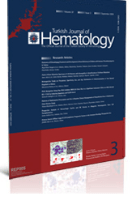
Turkish Journal of Hematology
Empowering the global hematology community through open access.Turkish Journal of Hematology is an esteemed publication dedicated to advancing the field of hematology, producing influential research since its inception in 1999 under the auspices of GALENOS PUBL HOUSE. With an Open Access model, it facilitates widespread dissemination of knowledge, allowing researchers, clinicians, and students to stay abreast of the latest developments in blood disorders and treatments. With an ISSN of 1300-7777 and an E-ISSN of 1308-5263, the journal holds a commendable position in the academic community, evidenced by its 2023 Q3 ranking within the hematology category and its standing at #80 out of 137 in the Scopus database, placing it in the 41st percentile. Covering a wide scope of topics within hematology, this journal serves as a critical resource for disseminating innovative research and clinical practices pertinent to the ongoing challenges faced in this vital area of medicine. With its continuous publication until 2024, Turkish Journal of Hematology remains a beacon for enhancing the understanding and treatment of hematological conditions within the Turkish and global medical communities.

Hematologie
Driving Clinical Practice with Cutting-Edge ResearchHematologie is a highly regarded journal in the field of hematology, published by JOHN LIBBEY EUROTEXT LTD. With an ISSN of 1264-7527 and an E-ISSN of 1950-6368, this journal has established itself as a vital resource for researchers, clinicians, and students dedicated to advancing the understanding of blood disorders and treatments. Although the journal's coverage in Scopus was discontinued in 2018, it has continually provided invaluable insights and research findings. The journal aims to foster knowledge sharing and discussion in hematology, exploring innovative methodologies and emerging trends in the field. With a commitment to quality research, Hematologie remains an essential platform for disseminating critical findings that can drive clinical practice and influence future studies in hematological sciences.

INTERNATIONAL JOURNAL OF HEMATOLOGY
Pioneering Discoveries in Hematological ScienceThe INTERNATIONAL JOURNAL OF HEMATOLOGY, published by SPRINGER JAPAN KK, serves as a critical platform for advancing research in the field of hematology. With a prestigious history spanning over three decades from 1991 to 2024, this journal is recognized for its impactful contributions, evidenced by its Q2 category ranking in Hematology for 2023, and its notable position at rank #71 out of 137 in the Scopus Medicine Hematology category. Researchers and professionals within the hematology community benefit from the journal's rigorous peer-reviewed articles that cover a wide range of topics, including clinical studies, basic research, and novel therapeutic strategies. Though currently non-open access, it provides essential insights and findings to an audience passionate about the latest advancements in blood disorders and treatments. Situated in Japan, the journal not only showcases high-quality research but also fosters a global exchange of knowledge in hematology, making it a significant resource for scholars, practitioners, and students alike.
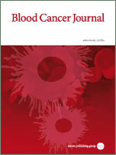
Blood Cancer Journal
Elevating standards in blood cancer studies.Blood Cancer Journal, published by SPRINGERNATURE, is a leading open-access journal that has been at the forefront of hematology and oncology research since its inception in 2011. With an impressive impact factor and a commitment to disseminating high-quality research, it holds a prestigious Q1 ranking in both hematology and oncology categories as of 2023. The journal is dedicated to publishing innovative studies, comprehensive reviews, and insightful commentaries that advance our understanding of blood cancers, making it an essential resource for researchers, healthcare professionals, and students in the field. Its open-access model ensures that groundbreaking research is accessible to a global audience, promoting collaborative efforts to enhance treatment methodologies and patient outcomes. With a strong reputation illustrated by its Scopus rankings—8th in hematology and 30th in oncology—Blood Cancer Journal exemplifies excellence and leadership in the ever-evolving landscape of cancer research.
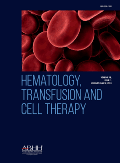
Hematology Transfusion and Cell Therapy
Transforming research into clinical practice.Hematology Transfusion and Cell Therapy, published by Elsevier, is a leading Open Access journal dedicated to advancing the fields of hematology, immunology, and transfusion medicine. Since its establishment in 2018, this journal has provided a vital platform for sharing innovative research and clinical advancements in the management of blood disorders and cellular therapies. Based in Brazil, it attracts a global audience, facilitating access to high-quality research that influences clinical practice and policy. With a current impact factor that places it in the Q3 category for both hematology and immunology as of 2023, the journal is recognized for its rigorous peer-review process and commitment to disseminating significant findings. By featuring a diverse range of articles, from original research to reviews, Hematology Transfusion and Cell Therapy aims to foster collaboration and knowledge sharing among researchers, professionals, and students alike, empowering them to tackle emerging challenges in their fields.
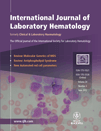
International Journal of Laboratory Hematology
Empowering researchers with cutting-edge findings in hematology.The International Journal of Laboratory Hematology, published by WILEY, serves as a vital resource in the field of hematology, delivering high-quality research findings and innovations within laboratory practices since its inception in 2007. This journal, accessible under Open Access options, showcases cutting-edge studies that span critical aspects of biochemistry and clinical laboratory methodologies. With a notable impact factor reflected in its Q2 and Q3 rankings across various categories—such as Biochemistry (medical) and Hematology—this journal stands out within the Scopus rankings, positioning itself within the 60th and 59th percentiles of its respective fields. Situated in the United Kingdom, the journal's objectives lie in disseminating pivotal research that enhances our understanding of hematological disorders and laboratory techniques, making it an essential tool for researchers, professionals, and students alike who are committed to advancing the science of laboratory hematology and its applications.

Indian Journal of Hematology and Blood Transfusion
Transforming Blood Health: Where Research Meets PracticeIndian Journal of Hematology and Blood Transfusion, published by SPRINGER INDIA, serves as a leading platform for disseminating original research, reviews, and case studies in the field of hematology. With an ISSN of 0971-4502 and E-ISSN 0974-0449, this journal has been instrumental in advancing knowledge from 2000 to 2024, providing insights into critical issues surrounding blood disorders and transfusion practices. Currently ranked in the Q3 category for Hematology for 2023, it reflects a commitment to high-quality scientific content amidst a competitive landscape where it ranks 97/137 in Scopus for Medicine - Hematology, placing it in the 29th percentile of its peers. The journal primarily addresses a diverse readership, including researchers, healthcare professionals, and students, aiming to foster innovation and collaboration within the field. Although it operates under a subscription model, access options for individual articles and institutional subscriptions ensure that valuable research is disseminated widely to enhance medical practice and education in hematology.

Mediterranean Journal of Hematology and Infectious Diseases
Pioneering the future of hematology and infectious diseases.Mediterranean Journal of Hematology and Infectious Diseases is a distinguished open access journal published by MATTIOLI 1885, dedicated to advancing the field of hematology and infectious diseases. Since its inception in 2009, the journal has provided a platform for researchers and practitioners to disseminate innovative findings, foster scholarly discourse, and enhance our understanding of these critical medical disciplines. With an impact factor reflecting its scholarly influence, it is recognized in the Q3 quartile for both Hematology and Infectious Diseases categories as of 2023. The journal's commitment to open access ensures that high-quality research is accessible to a global audience, contributing to the improvement of clinical practices and public health. Located in Fidenza, Italy, the journal continues to support converged research efforts from 2010 to 2024, making it an essential resource for academics, clinicians, and students in the medical community.
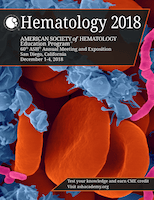
Hematology-American Society of Hematology Education Program
Unlocking Insights for Hematology ProfessionalsHematology-American Society of Hematology Education Program is a premier peer-reviewed journal dedicated to advancing the field of hematology through comprehensive educational content. Published by the American Society of Hematology, this journal plays a crucial role in disseminating knowledge to researchers, clinicians, and students in hematology and related disciplines. With an impressive Q1 status in the field, it ranks among the top journals at the forefront of hematological research, as evidenced by its 60th percentile ranking in Scopus' Medicine - Hematology category. Although it does not offer open access, the journal provides invaluable insights and educational resources from leading experts, focusing on the latest advancements, treatment protocols, and evolving understanding of blood disorders. Covering a wide range of topics, from basic research to clinical applications, this journal is essential for anyone seeking to deepen their expertise and stay informed on the latest developments in hematology. For further engagement, readers can access insightful articles published since 2001, ensuring a rich repository of knowledge for ongoing research and clinical excellence.